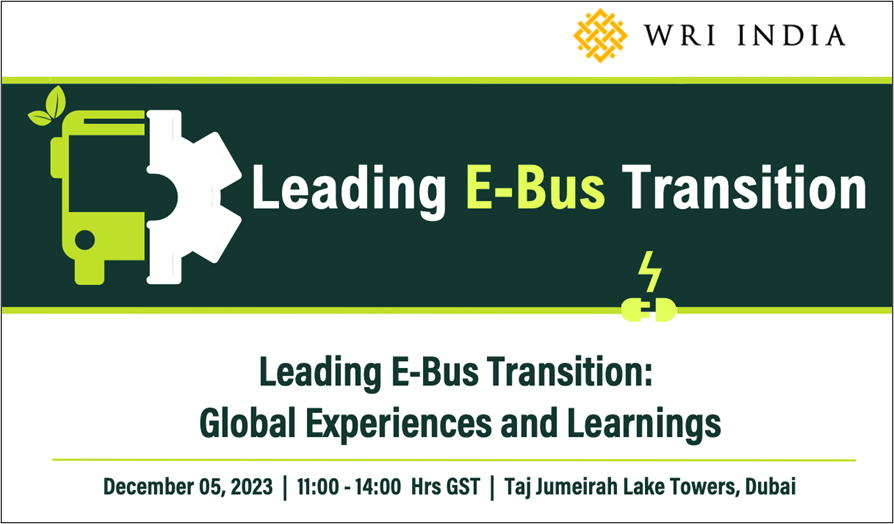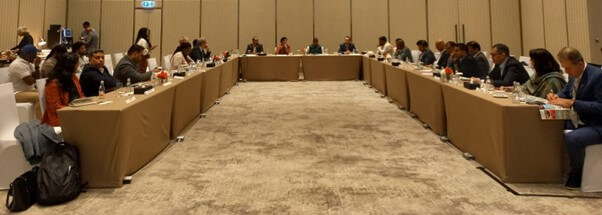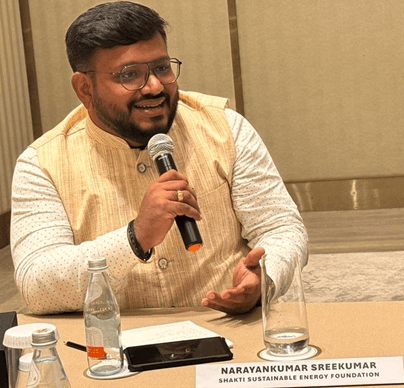
At COP 28, World Resources Institute (WRI), India, organised a side event on ‘Leading E-Bus Transition: Global Experiences and Learnings’ on December 5, 2023, at Taj Juneirah Lakes Towers, Dubai.

At the Roundtable, the key barriers discussed were the accelerated adoption of e-buses, including payment risks for operators/original equipment manufacturers (OEMs) and operational risks for public bus agencies. Cities across the globe adopted innovative business models to address these issues.

Narayankumar Sreekumar, Associate Director, Electric Mobility, Shakti said “As we navigate the path to a greener future, let’s harness the power of data analytics to drive change. Optimising charging station locations through insightful analysis of e-bus routes and energy consumption patterns is the key to efficiency. Strategic placement and smart scheduling pave the way for a sustainable tomorrow. Building a robust digital public infrastructure is not just a choice, it’s our commitment to fostering public transport electrification.”
Background
Globally, countries are investing in cleaner and more reliable public transport systems. Buses are a cornerstone of urban mobility and are critical for decarbonizing the urban transport sector. In a world increasingly sensitive towards climate change, electric buses are poised to be the global drivers of this transition. By 2021, Europe had over 8,500 e-buses, and in Latin America, Colombia is leading the transition with 3,700 e-buses. India has emerged as a leader for e-buses in South Asia, currently operating 5,700 e-buses and aiming to deploy 50,000 e-buses by 2030. Notably, cities like Shenzhen in China have achieved 100% electrification with around 16,000 e-buses.
India’s electric bus story took off in 2021 with support from the national program to aggregate e-bus demand, coupled with subsidies provided under the Faster Adoption and Manufacturing of (Hybrid &) Electric Vehicles in India (FAME) scheme. The resultant demand signal and economies of scale helped e-buses achieve price parity with internal combustion engine (ICE) buses at a much earlier stage of development of the e-mobility ecosystem.
In August 2023, the Ministry of Housing and Urban Affairs, Government of India launched a flagship initiative, the Prime Minister (PM) – eBus Sewa scheme, which will help deploy 10,000 e-buses through a public-private partnership (PPP) model in 169 cities. So far, over 15,500 e-buses have been tendered out through demand aggregation. Furthermore, India and the United States have launched a “Payment Security Mechanism (PSM)” which will facilitate the deployment of 38,000 made-in-India e-buses.
The learnings from India’s e-bus journey are also being translated to the commercial freight vehicle ecosystem. NITI Aayog, in collaboration with WRI India, launched the country’s first national electric freight platform – e-FAST India (Electric Freight Accelerator for Sustainable Transport – India) during the Clean Energy Ministerial (CEM) in July 2023. Prominent manufacturing companies and logistics service providers in India have come together to express a demand for 7,750 electric freight vehicles by 2030 under the platform.
Key barriers to accelerated adoption of e-buses include payment risks for operators/original equipment manufacturers (OEMs) and operational risks for public bus agencies. Cities across the globe have adopted innovative business models to address these issues.
